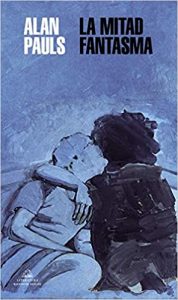It's always good to meet up with old friends like Allan Pauls. A writer you lost track of is like that high school classmate you meet over a few beers and you end up lying about the divine and the human. Because romance is lying like knaves. But also any magic show is a hoax and whoever coaxes us with the ace of cups receives applause in return.
So it's time to applaud the return of the intermittent writer, probably the most sincere of all (not just Pauls but all those narrators who tell something when they certainly have something to tell). Either way we are going to enjoy it whatever the occasion we read it. Because that sincerity that emerges imperiously as a novel, essay or whatever it touches, arrives blessed by the gift of opportunity.
After decades of writing with his particular cadence, Pauls continues to handle that baton of Argentine storytellers of the first magnitude. And that currently young values like Samantha Schweblin, sacheri and many others who cultivate the story or the novel from very different perspectives but with that beautiful and raw truth. But Pauls remains always current, in shape. And furthermore, literature is not a competition because no one here earns almost anything by writing or reading. If anything save the soul a little.
Top 3 Recommended Books by Alan Pauls
Half ghost
Literature has always been in charge of introducing us to the most eccentric characters of each era. From Don Quixote to Ignatius Reilly. And the funny thing is that seen from our mediocrity and normality, the shrillness of the crazy people and their philias and phobias end up in tune with our way of seeing the world at times. And that is why it is always good to bring out crazy people in the light of literature. So that the rest of us understand that we are very sane in our conception that destiny, our best destiny, is just around the corner ...
He is not planning to move, but is looking for apartments for rent. Read notices and visit inhabited houses, fleeting intruder in other people's lives. He does not need anything (and is exasperated by technology), but he wanders the internet buying gadgets, old things, stuffed bugs, for the pleasure of entering the history of others.
But what happens to Savoy - still in his fifties, fond of innocuous touches - when he crosses paths with Carla, a happy thirty-year-old, without attachments, who travels from country to country taking care of houses, pets, marijuana plants? Which of the two worlds changes, lights up, loses its head more on impact? Between trips, pools and digital delusions, Half ghost explores a superstition that continues to reveal us: the idea that somewhere there is something, someone, to the exact measure of our desires.
On
All light has its shadow in the same way that all love has its killer instinct or its unattainable will to discouragement from fucking an ex. The matter takes on a neurotic and strangely metaphorical look, because in the stridency of a broken relationship like the one presented here we find notes that tune in with us, with the disparate notion of what we love and want to forget. Or what we forget without knowing why and now we would only wish to recover its aroma ...
After thirteen years of love, Rimini and Sofia separate. For him, everything is new and shiny again. But his relationship with Sofia has not died; it has only changed form. And when he returns, ambushing him, love has the face of horror. Enamored-zombie, insomniac specter and avenger, Sofia reappears again and again on the horizon of Rimini to reconquer, torture or redeem him.
And Rimini sinks little by little into an abyss of nightmare or comedy, where sentimental blackmail, betrayal and even crime are commonplace. He is losing everything: work, health, new loves, even a son, and his ordeal will suffer a turn when he meets the Women who Love Too Much, a cell of emotional terrorism led by Sofia. An exemplary story about the metamorphoses that passions undergo when they enter the black hole of their posterity. A love-horror novel that exposes the other side of that comedy that human beings call a "couple."
The modesty of the pornographer
Pauls' first novel combines the strange mastery of the innate writer with a deceptive depth, as if more pretentious to vindicate the arrival of the budding writer. Despite the whole set it is a fucking gem (takes cacophony) and the final feeling is that the indicated pretentiousness about the knowledge of the human soul is, by right, something that is better handled at the twenty-something years to which the author wrote to this novel that not at fifty, when you no longer even know what you have it for.
Secluded in an apartment, a pornographer answers the letters that men and women, devoured by passion, write him. He is, or should be, the one to guide you through a maze made of vertigo and lust. To rescue them or give them meaning. It is a strenuous job, of Kafkaesque roots, that barely allows him a few hours of sleep and consumes him emotionally.
He only has one respite: to watch his beloved Úrsula from the balcony, who appears in a park at a few moments of the day, always in the same place, always the same comfort. But she decides to change the rules of the relationship. No longer visual, but epistolary. The pornographer for the first time receives and writes love letters. A messenger carries them and brings them, with increasing urgency. The measure of time becomes reading to Úrsula and writing to her.
In his ivory tower of desire, the pornographer discovers that his old life is running out, and he barely gets a glimpse of the one to come. A tortuous happiness is at hand, and yet it is evaded. Does he long to meet his beloved or just her letters? Who is this messenger, who presents himself with a mask and is so intimate with his lady? While the uncertainty paralyzes him, a new vision, the definitive one, is hatched behind his back.
The Modesty of the Pornographer is a superb novel about the paradoxes and obsessions that love can trigger. It is the story of a ghostly relationship and a real passion. Thirty years after its publication, and accompanied by an unpublished postface written by the author for this edition, Alan Pauls' first book is also a map in code, and not always in code, of the prose and the themes that his literature has expanded.



